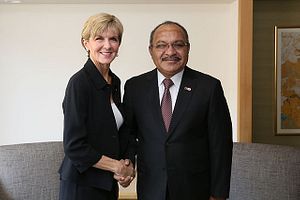Early last week officers from Papua New Guinea’s police force opened fire on a crowd of university students in Port Moresby. Conflicting reports from the media suggests that either the university students were hampering a police attempt to arrest the head of a student union or that the students were engaged by police as they were travelling to deliver a petition to PNG’s Prime Minister Peter O’Neill. Conflicting reports have also been published, some stating that there have been deaths while others indicate that only injuries have been sustained. Regardless of the exact details relating to the incident there are several factors that are undeniably present.
First, tensions have been escalating recently for Peter O’Neill as a result of corruption allegations. O’Neill allegedly authorized fraudulent payments to a legal firm and a result of his efforts to delay the investigation has resulted in the disbanding of a corruption taskforce and the sacking of both the police commissioner and attorney general.
Second, the incident highlights the perils of the capability shortfall of PNG’s police force. Understrength officers with insufficient training and equipment are being managed by a force that is itself subject to widespread corruption both internal and external. Police in PNG do not have access to modern crowd control training and have limited equipment available to them that would enable them to mitigate the risks posed by an aggressive crowd. Without such equipment and training police in PNG have had to resort on multiple occasions to firing live ammunition into crowds in order to halt rioting. While this technique in itself is unacceptable in modern society, PNG authorities simply have no other option.
With tourists, expatriates and business now in fear of further violence, it is time for Australia to seriously address the issue of assistance programs to PNG. The programs in place too often focus on minor issues without addressing wider societal shortcomings. Australia has already identified issues within the PNG police force, however recent events highlight that while these issues have been identified, little headway has been made in the way of progress.
PNG and Australian officials need to make more effort in increasing joint PNG-Australian police operations and Australia needs to insist that it will coordinate the distribution of funds given through aid programs to organizations and departments that are plagued with corruption. The concept of providing funding in an effort to cease corruption cannot be successful if the funds that are provided are directly put into the hands of those that are corrupt.
Whilst it has been reported that Australian Foreign Minister Julie Bishop has offered Australian assistance in the unfolding situation, now is the time to ensure that the support provided is that which has a long-term effect on the ground. The people of PNG deserve a competent government that is effectively supported by its neighbors, while the Australian people have the right to ensure that the taxpayer funds provided do not go into the hands of the corrupt.
Chris Sheahan is a former Australian Army Officer who works as a security consultant for Ludus Resources Group. Follow him on Twitter @cj_sheahan.

































